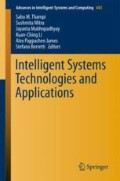Abstract
Automated Quiz Generator (AQG) is an extension of the factual question generation system implemented by Michael Heilman, which is generic and therefore applicable to any given domain of discourse in natural language. The extensions mainly include the ability to make MCQs out of generated questions and ranking questions by interestingness of the sentence in the input text from which the respective question was generated. Besides, it has functionality to extract interesting trivia from Wikipedia articles of important entities in the input text. Being domain independent, this system relies on DBpedia - a database of structured content extracted from Wikipedia, the largest general reference work on the Internet.
Notes
References
Al-Yahya, M.: Ontoque: a question generation engine for educational assesment based on domain ontologies. In: 2011 11th IEEE International Conference on Advanced Learning Technologies (ICALT), pp. 393–395. IEEE (2011)
Berners-Lee, T.: Backward and Forward links in RDF just as important (2006). http://dig.csail.mit.edu/breadcrumbs/node/72. Accessed 24 Apr 2017
Cubric, M., Tosic, M.: Towards automatic generation of e-assessment using semantic web technologies. Int. J. e-Assess. (2011)
Daiber, J., Jakob, M., Hokamp, C., Mendes, P.N.: Improving efficiency and accuracy in multilingual entity extraction. In: Proceedings of the 9th International Conference on Semantic Systems, pp. 121–124. ACM (2013)
Heilman, M.: Automatic factual question generation from text, Ph.D. thesis, Carnegie Mellon University (2011)
Heilman, M., Smith, N.A.: Question generation via overgenerating transformations and ranking. Technical report, DTIC Document (2009)
Klein, D., Manning, C.D., et al.: Fast exact inference with a factored model for natural language parsing. In: Advances in Neural Information Processing Systems, pp. 3–10 (2003)
Levy, R., Andrew, G.: Tregex and Tsurgeon: tools for querying and manipulating tree data structures. In: Proceedings of the Fifth International Conference on Language Resources and Evaluation, pp. 2231–2234. Citeseer (2006)
Lehmann, J., Isele, R., Jakob, M., Jentzsch, A., Kontokostas, D., Mendes, P.N., Hellmann, S., Morsey, M., van Kleef, P., Auer, S., et al.: DBpedia-a large-scale, multilingual knowledge base extracted from Wikipedia. Semant. Web J. (2014)
Lopetegui, M.A., Lara, B.A., Yen, P.-Y., Çatalyürek, Ü.V., Payne, P.R.: A novel multiple choice question generation strategy: alternative uses for controlled vocabulary thesauri in biomedical-sciences education. In: AMIA Annual Symposium Proceedings, vol. 2015, p. 861. American Medical Informatics Association (2015)
Lassila, O., Swick, R.R.: Resource description framework (RDF) model and syntax specification (1999)
Mitkov, R., Ha, L.A.: Computer-aided generation of multiple-choice tests. In: Proceedings of the HLT-NAACL 03 Workshop on Building Educational Applications Using Natural Language Processing, vol. 2, pp. 17–22. Association for Computational Linguistics (2003)
O’Connor, B., Heilman, M.: ARKref: a rule-based coreference resolution system (2013). arXiv preprint arXiv:1310.1975
Papasalouros, A., Kanaris, K., Kotis, K.: Automatic generation of multiple choice questions from domain ontologies. In: e-Learning, pp. 427–434. Citeseer (2008)
Prakash, A., Chinnakotla, M.K., Patel, D., Garg, P.: Did you know?-mining interesting trivia for entities from wikipedia. In: IJCAI 2015, pp. 3164–3170 (2015)
Tosic, M., Cubric, M.: SeMCQ-Protégé Plugin for automatic ontology-driven multiple choice question tests generation. In: Proceedings of the 11th International Protege Conference. Stanford Center for Biomedical Informatics Research (2009)
Tsurel, D., Pelleg, D., Guy, I., Shahaf, D.: Fun facts: automatic trivia fact extraction from wikipedia (2016). arXiv preprint arXiv:1612.03896
Author information
Authors and Affiliations
Corresponding author
Editor information
Editors and Affiliations
Rights and permissions
Copyright information
© 2018 Springer International Publishing AG
About this paper
Cite this paper
Bongir, A., Attar, V., Janardhanan, R. (2018). Automated Quiz Generator. In: Thampi, S., Mitra, S., Mukhopadhyay, J., Li, KC., James, A., Berretti, S. (eds) Intelligent Systems Technologies and Applications. ISTA 2017. Advances in Intelligent Systems and Computing, vol 683. Springer, Cham. https://doi.org/10.1007/978-3-319-68385-0_15
Download citation
DOI: https://doi.org/10.1007/978-3-319-68385-0_15
Published:
Publisher Name: Springer, Cham
Print ISBN: 978-3-319-68384-3
Online ISBN: 978-3-319-68385-0
eBook Packages: EngineeringEngineering (R0)

